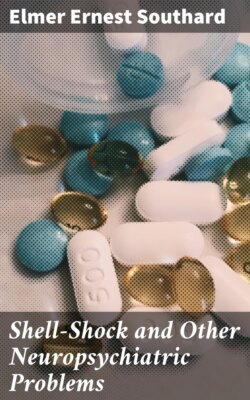Читать книгу Shell-Shock and Other Neuropsychiatric Problems - Elmer Ernest Southard - Страница 69
На сайте Литреса книга снята с продажи.
ОглавлениеDesertion in epileptic fugue.
Case 61. (Verger, February, 1916.)
A blacksmith from the Rochefort Arsenal, 27 (nothing known as to grandparents; father, now in the fifties, for 30 years in an asylum with frequent attacks of furor; mother, 45, well and apparently well-balanced; brother with the colors, wounded and decorated with the military medal; a cousin-german, who has had a typical epilepsy—in the patient himself enuresis up to 13 or 14, later, less frequently; apparently no tongue-biting; no information as to infectious diseases; graduate from primary school, apprenticed to a blacksmith; an unskilful worker; never able to rise to the level of a frappeur), in 1909 had passed the board of review and been put in the sixth division of the line. Antebellum there was a history that one night at supper, he had slipped away from quarters and gone 30 kilometres, home. His astonished mother sent him back to the military post by railway.
Upon the night of May 26–27, 1915, this soldier found himself in the position of a sentry, opposite the enemy. He told his comrade that he had to go away for a time, leaned his gun against a tree, disappeared, and did not return. It was then one o’clock in the morning. At six o’clock, he was found two kilometres away from the lines, in a village. He was in front of a barn where his company had been quartered before taking possession of the advanced posts.
He was brought up before the military authorities; but upon stating that in civil life he had wandered off several times without knowing where he was going, he was submitted to neurological examination. There was available a letter from his family physician relative to his antebellum military service. It appeared that he had committed a number of breaches of discipline, and that he was regarded by the physicians as a déséquilibré. He had lived with his mother a very quiet and good life; there was no history of sexual irregularity, and no history of illness except a slight catarrhal jaundice. He had frequently suffered from headaches; there had been slight attacks of vertigo of very brief duration. He had never fallen in these fits. From his story it was elicited that he had had absences; his comrades had noticed that he sometimes stopped stock-still with vague eyes, then shortly regained his wits and continued upon his task. Sometimes he would not work without being able to explain why he went away. He would go off for a period and, upon coming to, discover that he had not eaten his meals. There were never, however, any convulsive crises by day or night. He sometimes felt sick, and although there was no medical treatment, from time to time he took bromides upon his own authority, saying he had been ordered to do so by his father. Although habitually of a gentle demeanor, nevertheless he was subject to excessive anger upon slight occasion.
During the mobilizing and first months of the war, both in quarters and at the front, however, his conduct had been that of a good soldier. Suddenly, about March or April, 1915, the nocturnal enuresis began to be frequent again, occurring twice or three times a week; but the patient hid this misfortune as far as possible from his comrades. The captain thought he looked tired and depressed sometimes. Upon the days following the nights with enuresis, there was intense headache and marked moral and physical depression. There was no proof of nocturnal convulsions, and it is very problematical whether there was tongue-biting.
Another odd feature was that the patient, who had been sober in civil life, had become intoxicated several times after going into the army. Physically, he was of low stature, but otherwise well built. Neurologically, he was entirely negative. There was no sign of venereal disease. There were a few stigmata of degeneration; for instance, there was very little hair upon the face, the ears were unequal in size, and the teeth were somewhat anomalously set. Mentally, he was below par; for instance, he could not add mentally two numbers of two digits.
As to his desertion, the patient says he does not know what he did; that he learned of his act only from his comrades in the morning; that he remembered having left his duty pour aller satisfaire un besoin.
